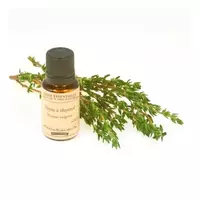Thyme oil

Despite the fact that the aromatic thyme plant in our latitudes is most common under another name - thyme - it is used very widely in a wide variety of areas of human life. Most often, thyme is used in cooking, where it acts as a spice both fresh and dried. In addition, thyme is also used for medicinal purposes - it can quite often be found in many pharmaceuticals.
In general, this herbaceous plant is scientifically classified as a taxonomic species and belongs to the Yasnotkovy family. Outwardly, thyme is a stunted shrub, the height of which rarely exceeds 35 centimeters. This plant blooms with small inflorescences of white or purple color. The fruits of the thyme are similar to miniature boxes, inside which there are spherical nuts.
It is worth noting that thyme is an important vegetable raw material from which it is customary to isolate essential oil and phenolic compounds of carvacrol and thymol. The content of these biologically active natural compounds determines the beneficial properties of thyme oil.
A light, fluid, brownish liquid is the essential oil of thyme, which is distinguished by a spicy, tart, oily aroma. At the same time, it is characterized by raw, earthen upper tonality, medium - husks of seeds, leather - lower.
According to the class, thyme oil is usually attributed to the aromas of relaxation, so it helps to relax, calm, as well as remove neuroses and fears. With natural thyme oil, you can quickly regain strength and improve the quality of sleep.
The effective antiviral property of thyme oil is especially pronounced in an influenza epidemic. Having a positive effect on the organs of the respiratory tract and having an effective exhilarating effect, thyme oil helps to stop inflammatory processes, improve the effectiveness of breathing, and cope with coughing. In addition, it contributes to the active effect on viruses for sore throat, colds, runny nose and herpes. It is often used to relieve toothache.
Thyme essential oil helps with cramps and intestinal atonia. By optimizing the work of the gastrointestinal tract, this natural medicine enhances enzymatic activity. It has been found that thyme oil is also able to normalize the functioning of the liver and gallbladder, having a positive effect on the breakdown and elimination of fats from the body.
However, with numerous beneficial properties of thyme oil, this product also has its own contraindications. In particular, it is forbidden to use this essential oil in pregnancy, epilepsy, high-grade hypertension, skin hypersensitivity, as well as in the presence of individual intolerance to the components in the composition of this plant.
899 kCal thyme oils
Energy value of thyme oil (Ratio of proteins, fats, carbohydrates - ju):
Proteins: 0 g (~ 0 kCal)
Fats: 99.9 g (~ 899 kCal)
Carbohydrates: 0 g (~ 0 kCal)
Energy ratio (b | y): 0% | 100% | 0%
 Español
Español Français
Français Português
Português Русский
Русский 简体中文
简体中文 繁體中文
繁體中文 日本語
日本語 한국어
한국어 العربية
العربية Türkçe
Türkçe Қазақ
Қазақ Deutsch
Deutsch Italiano
Italiano Українська
Українська
